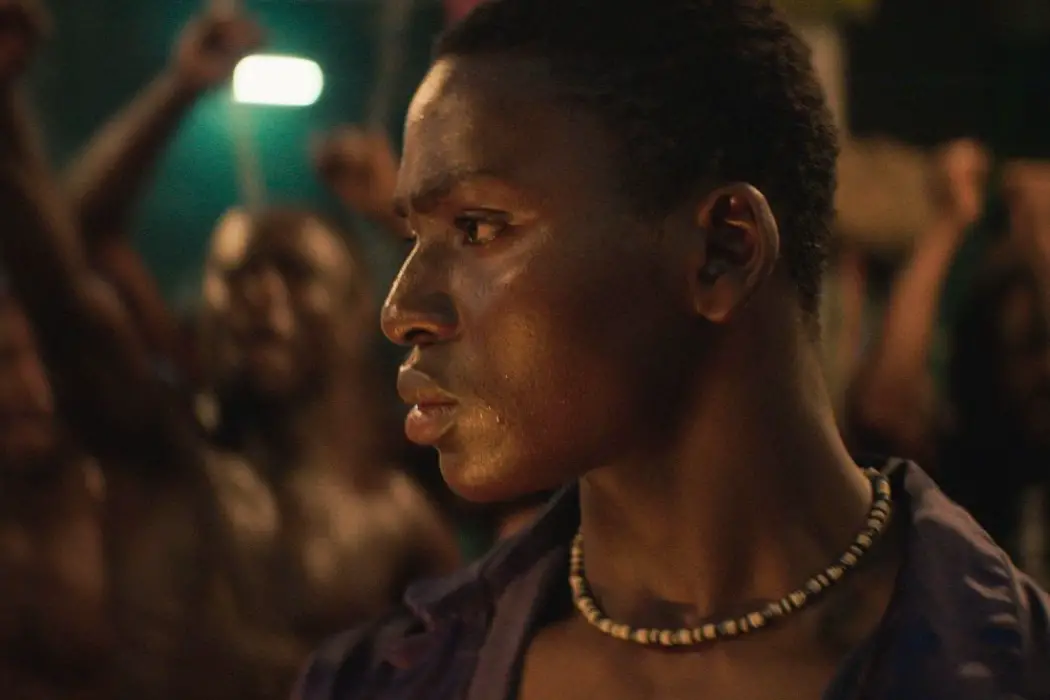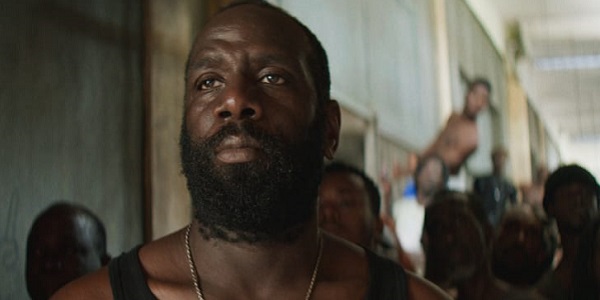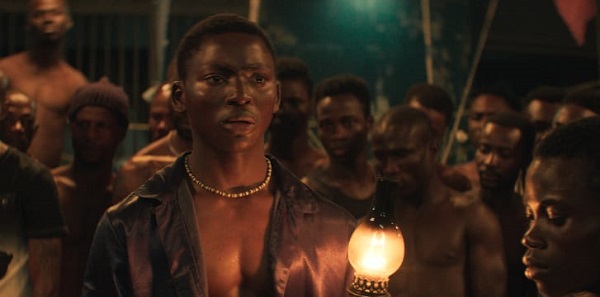NYFF 2020: NIGHT OF THE KINGS: Storytelling Magic

Lee Jutton has directed short films starring a killer toaster,…
In the tradition of One Thousand and One Nights, Ivorian filmmaker Philippe Lacôte’s latest narrative feature, Night of the Kings, is an ode to the power of storytelling to transport and transform. Set inside a fictionalized version of a real prison in Abidjan that Lacôte visited as a child when his mother was held there for political reasons, with a cast that includes many who served time behind bars themselves, Night of the Kings mixes the magic of ancient myth with the harshness of modern reality to create something entirely unique, and cements Lacôte’s reputation as a master storyteller himself.
The Long Night
Violent young offenders and gang members in Côte d’Ivoire are referred to as “microbes.” When one of these so-called microbes (newcomer Koné Bakary) is arrested for pickpocketing, he is brought to La MACA, a notorious prison where prisoners not only roam freely throughout the facility but essentially run the place. Chief among them is Blackbeard (Steven Tientcheu, recently seen in last year’s French Oscar submission Les Misérables), an aging inmate whose rule over La MACA is weakening as the disease that forces him to rely on an oxygen mask gradually takes over his body.
According to the law of La MACA, Blackbeard must step down and commit suicide when he is no longer strong enough to rule. Several of his followers are waiting in anticipation for this moment, in the hope that they can seize power in his absence. But Blackbeard is not quite ready to depart. Instead, he demands that the guards deliver the newest inmate to him. Dubbing the new arrival Roman, Blackbeard announces that the next time there is a blood-red moon, the Roman must stay up all night telling them stories. If Roman is unable to keep his story going until dawn, he will die. Naturally, there is a red moon set to appear that very night; Blackbeard is hoping that by offering up Roman as a storyteller and sacrifice, the inmates will forget about his declining condition.

Turns out, the chosen Roman was raised by a relative who was a traditional West African storyteller known as a griot, and her talents have been passed on to him. Roman weaves a fantastical story about his childhood friend, the notorious gang leader known as Zama King, that stretches from the pre-colonial days of West African royalty through the 2011 arrest of Ivorian president Laurent Gbagbo all the way to Roman’s recent capture by the authorities. His story is illustrated by song, dance, and pantomime from his fellow prisoners, who use their own talents to participate in the tradition themselves. But even with Roman’s skill at drawing out his tangled story with twists and turns, it seems as though the night will stretch on forever…and some of the inmates are growing impatient for some form of blood to be shed. The question is whether it will be that of Roman, or of Blackbeard.
Finding an Escape
Whether it be Zama’s blind father attempting to convince a mighty queen that he can deliver a win in battle, Blackbeard’s subordinates killing someone close to their leader in the hope of further weakening his resolve to live, or Roman randomly inserting twists into his story to maintain his audience’s rapt attention, the desperate actions people will take in order to remain alive and in control dominate Night of the Kings. The struggle for power prescient throughout both Roman’s story of Zama King and the reality of life inside La MACA echoes that which has dominated life in Côte d’Ivoire for most of the 21st century thus far, including two civil wars. But Lacôte is less concerned with modern life outside La MACA in Night of the Kings than he is with the world ruled over by Blackbeard inside the prison, a miniature kingdom dominated by its own superstitions and strange traditions.
As Blackbeard, Steven Tientcheu oozes charisma and menace even when puffing on his oxygen mask, making it clear why he has been able to rule over La MACA with an iron fist for so long. Yet despite having been hardened by so many years behind bars, he is still human, and one can see flashes of vulnerability and even fear cross his face as Roman weaves his lengthy tale throughout the night. As for Roman himself, Koné Bakary has a natural screen presence that keeps one rapt throughout his story; you’ll find yourself as eager to hear what happens next as his audience is in the film.

Hauntingly, beautifully lit and photographed by cinematographer Tobie Marier-Robitaille, Koné Bakary’s Ivorian Scheherazade elevates the art of storytelling to something like ancient magic, with the power to pull you in and refuse to let you go. This is further emphasized by the way his fellow prisoners improvise their own music, dance, and other forms of performance to take part in the story themselves and to be transformed by it. When they raise their voices in song and twist their bodies to illustrate the actions of Zama King, they reveal their own inner power, something that cannot be crushed out of them even after years behind bars. They are storytellers in their own right, and a necessary reminder that there are so many voices out there that deserve to be heard that are instead muffled and quieted by the prison walls that surround them.
Conclusion
Night of the Kings explores how rituals, traditions, and stories can give people reasons to live even in the darkest times — a timeless message, but one that is all the more powerful with all that the world has gone through in 2020. I can’t wait to hear what other stories Lacôte has up his sleeve.
What do you think? What are your favorite films about storytelling? Share your thoughts in the comments below.
Night of the Kings is screening as part of the Main Slate at the 2020 New York Film Festival.
Watch Night of the Kings
Does content like this matter to you?
Become a Member and support film journalism. Unlock access to all of Film Inquiry`s great articles. Join a community of like-minded readers who are passionate about cinema - get access to our private members Network, give back to independent filmmakers, and more.
Lee Jutton has directed short films starring a killer toaster, a killer Christmas tree, and a not-killer leopard. Her writing has appeared in publications such as Film School Rejects, Bitch: A Feminist Response to Pop Culture, Bitch Flicks, TV Fanatic, and Just Press Play. When not watching, making, or writing about films, she can usually be found on Twitter obsessing over soccer, BTS, and her cat.













